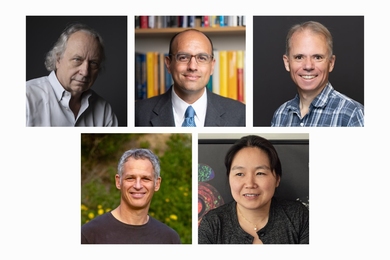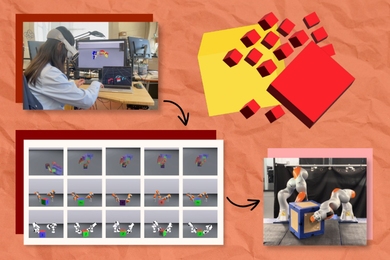The fact that Lawrence H. Summers (SB 1975, economics) has reached a pinnacle in his career comes as no surprise to those who knew him during his MIT days. Dr. Summers was sworn in as the country's 71st Secretary of the Treasury on July 2, replacing Robert E. Rubin.
"He was always very bright," recalled Institute Professor Emeritus Robert M. Solow, who taught Dr. Summers as an undergraduate. "He definitely was not a late bloomer. He was probably born in full bloom."
Dr. Summers, whose parents were both economics professors, is the nephew of two Nobel Laureates -- Kenneth Arrow of Stanford University on his mother's side and Paul Samuelson of MIT on his father's side. Professor Solow, a Nobel laureate himself, remembers an occasion when classmates teased the young Mr. Summers about his roots. During a student skit, according to Professor Solow, the following exchange took place:
"There's a rumor that he's the son of God..."
"Wrong. He's the nephew."
Small talk at Thanksgiving dinners in the Summers' suburban Philadelphia home revolved around economic theory and current events, with children encouraged to join in. The teenaged Mr. Summers, who attended public schools and excelled in science and mathematics, was an active participant.
An outstanding debater as an undergraduate, Dr. Summers received his undergraduate degree from MIT in 1975 and was on the faculty from 1979-82, teaching public finance. Professor Paul Joskow was Dr. Summers' undergraduate advisor for three years.
"He was unusually bright and he had a serious interest in economics," said Professor Joskow. "He was a very good student, but definitely not a grind. He had outside interests, particularly the debate club."
Professor Rudiger W. Dornbusch, the Ford International Professor of Economics, remembers Dr. Summers as an engaging young colleague. "He was incredibly bright and clearly a star in his profession already in a wide range of areas," he said.
Dr. Summers earned a PhD from Harvard University in 1982 and served as domestic policy economist on the President's Council of Economic Advisors the following year. He was appointed a professor of economics at Harvard in 1983, at that time the youngest tenured professor in Harvard's history. He was the Nathaniel Ropes Professor of Political Economy at Harvard University from 1987-93.
From 1991-93, Dr. Summers also served as vice president of development economics and chief economist of the World Bank. As chief economist, he sat on the bank's Loan Committee, played a key role in the design of country assistance strategies, and had overall responsibility for research statistics and external training programs.
From 1993-95, Dr. Summers was Undersecretary of the Treasury for International Affairs. In that position, he had broad responsibilityin the formulation and execution of international economic policies.
Appointed deputy treasury secretary in August 1995, Dr. Summers had a leadership role in the department's work on international policy issues, tax policy issues, issues relating to the financial system, domestic policy issues and enforcement issues.
"His views have become more conservative, less activist," said Professor Dornbusch. "There isn't any fooling around in the foreign markets and exchange markets."
Dr. Summers is the third MIT graduate to serve in the cabinet in recent years, the second as Secretary of the Treasury. George Shultz (PhD 1949) was Secretary of Labor, Secretary of the Treasury and Secretary of State during the Nixon and Reagan administrations. Les Aspin (PhD 1965) was Secretary of Defense in President Clinton's first cabinet.
At 45, Dr. Summers is the second-youngest Secretary of the Treasury, older than only Alexander Hamilton, who was 32 when he served in President Washington's cabinet.
"This is what he lives for," said Professor Dornbusch. "The only question is, what's next? Chairman of the Federal Reserve? President of the World Bank? Or Wall Street? He's very, very successful. A very fine person. He understands Washington well and he has made people accept economics."
While Dr. Summers has matured and become politically savvy over the years, Professor Joskow said, he remains the same in fundamental ways. "He's still a regular guy. He dotes on his kids and still loves to talk seriously about challenging economic problems," he said.
There has been one highly visible improvement since Dr. Summers' tour in academia. "He wears nicer suits these days," said Professor Joskow.
A version of this article appeared in the July 14, 1999 issue of MIT Tech Talk (Volume 44, Number 1).





